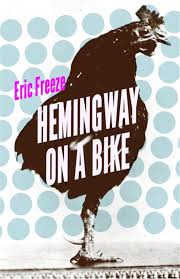On a whim a few Saturdays ago I tried a new style of yoga—laughing yoga. I didn’t really know what to expect. I imagined myself supine on the island of my own mat, working reflectively through a series of laughing exercises and meditations. I anticipated it would probably be a little uncomfortable, but I also anticipated pleasure and release; zen-like harmony with a little humor.
Instead, it was a practice in the absurd. Our group of about twenty strangers played tag with imaginary tickle cream. We told jokes in gibberish. We playacted car crashes, a catwalk, reactions to outrageous credit card bills, and we were required to laugh maniacally in response. I grinned and even giggled, accepting the exercises warily, playing along. And then we created a snake of bodies, each belly a pillow for another’s head until we all bounced and were bounced by laughter.
That’s when I lost it. I watched my neighbor’s expression as her head bounced from my spastic and battered abs. She squinted her eyes, furrowed her forehead, and smiled so relentlessly that I died with laughter. I made noises I’ve never made before. I lost the ability to make any noise. I rolled side to side, almost splitting our laughter snake. I gulped for breath. My face grew hot and red; people were staring. But I didn’t care. And I didn’t want it to stop.
The week before I took this class, I started reading Eric Freeze’s essay collection, Hemingway on a Bike (University of Nebraska, 2014), and while I didn’t expect laughing yoga to invoke anything literary per se, I couldn’t help but notice that my experience in the class reminded me of Freeze’s collection. The collection starts with the absurd image of Hemingway on a French racing bike, something that makes Freeze laugh: “The thought of Hemingway, this inadequate Hemingway, trying to fit French bike racing to his own brawny code of masculinity I found hilarious.” Freeze covers a broad range of strange topics, from foosball to beards, pro wrestling to Vulcans, Angry Birds to barracudas. Freeze artfully captures not only his meditations on these varied subjects, but his enticing imagination as well. And his playfulness is contagious.
With each essay, I found myself transported. I followed him from Canada to France to Midwestern America and back again. I felt invited to step away from the everyday familiarity of my own world for a few pages and examine the everyday familiarity of his world with him, simply because, as he says, “I couldn’t look away.” And he treats his subjects with delight. When pining for a particular foosball table, he writes: “A Bonzini. Just the uniqueness of the word, the unstressed, stressed, unstressed syllables, an amphibrach like in a limerick or a Dr. Seuss book, made me want to say it out loud . . . It was all I could do to keep the word out of my head: BON-ZI-NI. I felt like chanting it at a football game or naming a pasta dish after it.”
And Freeze’s delight in turn delights me. I am willing to go with him wherever he leads. I become a teenage boy, a playful father, a world traveler, a professor obsessed with foosball. With him, I examine masculinity, parenthood, social pressures, identity. And I’m not satisfied with a simple answer.
His collection unveils the complexities of an individual life, a single experience, desire, obsession. And with each essay I shed a little more self-consciousness. When I reached his final essay, “On Intimacy,” I was ready for this final rumination, the straight-faced honesty. I am left with beauty and pain, wonder and mystery. I am left changed. Freeze invites me to live, really live, to meet the absurd head-on, to not look away. And when I do, I walk away with a little more wisdom.
At the close of our laughing yoga class, we sat in a circle with one hand on our own heart and the other on the back of the person beside us. We breathed together, absorbed the energy of our collective laughter, and then sent it outward. We offered reflective words on the experience: Release. Joy. Acceptance. Connection. Harmony. We chanted. I thought of Hemingway on a bike, his brawn balanced on a thin French contraption, frustrated but determined, and I laughed one more time.
___
Elizabeth Brady is currently pursuing an MFA at Brigham Young University. Her essays appear or are forthcoming in Outlet, Inscape, and AWE: A Woman’s Experience.


3 comments
This Month in Mormon Literature, Early December 2014 | Dawning of a Brighter Day says:
Dec 6, 2014
[…] Freeze. Hemingway on a Bike (Elizabeth Brady, Brevity). “Freeze covers a broad range of strange topics, from foosball to beards, pro wrestling to […]
This Month in Mormon Literature, Early March 2015 | Dawning of a Brighter Day says:
Mar 9, 2015
[…] Freeze. Hemmingway on a Bike (Brevity Magazine). “The collection starts with the absurd image of Hemingway on a French racing bike, something […]
This Month in Mormon Literature, Early March 2015 | Dawning of a Brighter Day says:
Mar 30, 2015
[…] Freeze. Hemingway on a Bike (Brevity Magazine). “The collection starts with the absurd image of Hemingway on a French racing bike, something […]